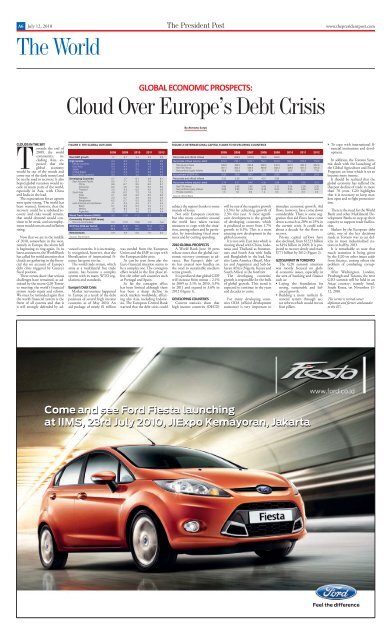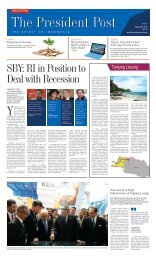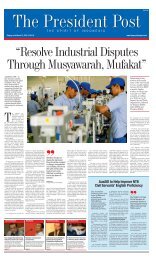Mari Pangestu: The Champion of Free Trade - The President Post
Mari Pangestu: The Champion of Free Trade - The President Post
Mari Pangestu: The Champion of Free Trade - The President Post
You also want an ePaper? Increase the reach of your titles
YUMPU automatically turns print PDFs into web optimized ePapers that Google loves.
A6<br />
July 12, 2010<br />
<strong>The</strong> <strong>President</strong> <strong>Post</strong><br />
www.thepresidentpost.com<br />
<strong>The</strong> World<br />
GLOBAL ECONOMIC PROSPECTS:<br />
Cloud Over Europe’s Debt Crisis<br />
By Atmono Suryo<br />
CLOUDS IN THE SKY<br />
Towards the end <strong>of</strong><br />
2009, the world<br />
community, including<br />
Asia, expected<br />
that the<br />
global economy<br />
would be out <strong>of</strong> the woods and<br />
come out <strong>of</strong> the dark tunnel and<br />
be on the road to recovery. It also<br />
hoped global recession would recede<br />
in many parts <strong>of</strong> the world,<br />
especially in Asia, with China<br />
and India in the lead.<br />
<strong>The</strong> expectations for an upturn<br />
were quite strong. <strong>The</strong> world has<br />
been warned, however, that the<br />
recovery could be a subdued recovery<br />
and risks would remain,<br />
that world demand would continue<br />
to be weak, and unemployment<br />
would remain and inflation<br />
rising.<br />
Now that we are in the middle<br />
<strong>of</strong> 2010, somewhere in the west,<br />
namely in Europe, the alarm bell<br />
is beginning to ring again. In its<br />
latest assessment, the World Bank<br />
has called for world attention that<br />
clouds are gathering in the financial<br />
sky on account <strong>of</strong> Europe’s<br />
debt crisis triggered by Greece’s<br />
fiscal position.<br />
<strong>The</strong>se events show that serious<br />
challenges have remained, as admitted<br />
by the recent G20 Toronto<br />
meeting: the world’s financial<br />
system needs repair and reform.<br />
We must be reminded again that<br />
the world financial system is the<br />
freest <strong>of</strong> all systems and that it<br />
is still strongly defended by ad-<br />
figure 1: THE GLOBAL OUTLOOK<br />
vanced countries. It is increasingly<br />
recognized, however, that the<br />
liberalization <strong>of</strong> international finance<br />
has gone too far.<br />
<strong>The</strong> world trade system, which<br />
aims at a multilateral free trade<br />
system, has become a complex<br />
system with its many WTO regulations<br />
and standards.<br />
Europe’s Debt Crisis<br />
Market nervousness happened<br />
in Europe as a result <strong>of</strong> the debt<br />
positions <strong>of</strong> several high income<br />
countries as <strong>of</strong> May 2010. An<br />
aid package <strong>of</strong> nearly $1 trillion<br />
2008 2009 2010 2011 2012<br />
Real GDP growth 1.7 -2.1 3.3 3.3 3.6<br />
High income<br />
OECD Countries<br />
Euro Area<br />
Japan<br />
United States<br />
Non-OECD countries<br />
Developing Countries<br />
East Asia and Pacific<br />
China<br />
Indonesia<br />
Thailand<br />
South Asia<br />
India<br />
Pakistan<br />
Bangladesh<br />
Latin America and Caribbean<br />
Brazil<br />
Mexico<br />
Argentina<br />
0.4<br />
0.3<br />
0.4<br />
-1.2<br />
0.4<br />
3.0<br />
5.7<br />
8.5<br />
9.6<br />
6.0<br />
2.5<br />
4.9<br />
5.1<br />
2.0<br />
6.2<br />
4.1<br />
5.1<br />
1.8<br />
7.0<br />
-3.3<br />
-3.4<br />
-4.1<br />
-5.2<br />
-2.4<br />
-1.7<br />
1.7<br />
7.1<br />
8.7<br />
4.6<br />
-2.3<br />
6.3<br />
6.8<br />
3.7<br />
5.7<br />
-2.3<br />
-0.2<br />
-6.5<br />
-1.2<br />
World <strong>Trade</strong> Volume (GNFS) 3.2 -11.8 11.2 6.7 7.3<br />
Commodity Prices (USD terms)<br />
Non-oil commodities 0.0 -21.6 16.8 -4.0 -5.4<br />
Oil Price (US$ per barrel)<br />
Oil price (percent change)<br />
97.0<br />
36.4<br />
61.8<br />
-36.3<br />
2.3<br />
2.2<br />
0.7<br />
2.5<br />
3.3<br />
4.2<br />
6.1<br />
8.7<br />
9.5<br />
5.6<br />
6.2<br />
7.3<br />
8.0<br />
3.0<br />
5.5<br />
4.5<br />
6.4<br />
4.3<br />
4.8<br />
78.1<br />
26.4<br />
2.4<br />
2.3<br />
1.3<br />
2.1<br />
2.9<br />
4.2<br />
5.9<br />
7.8<br />
8.5<br />
6.2<br />
4.0<br />
7.8<br />
8.5<br />
4.0<br />
5.8<br />
4.1<br />
4.5<br />
4.0<br />
3.4<br />
74..6<br />
-4.5<br />
Manufactures 5.9 -4.9 0.0 -3.7 0.0<br />
Source: World Bank<br />
2.6<br />
2.6<br />
1.8<br />
2.2<br />
3.0<br />
4.5<br />
6.1<br />
8.1<br />
8.7<br />
6.0<br />
5.0<br />
7.5<br />
8.0<br />
4.5<br />
6.1<br />
4.2<br />
4.1<br />
4.2<br />
4.4<br />
73.9<br />
-0.9<br />
was needed from the European<br />
Union and the IMF to cope with<br />
the European debt crisis.<br />
As can be seen from afar the<br />
Euro financial situation seems to<br />
be a complex one. <strong>The</strong> contagion<br />
effect would in the first place affect<br />
the other s<strong>of</strong>t countries such<br />
as Portugal and Spain.<br />
So far the contagion effect<br />
has been limited although there<br />
has been a sharp decline in<br />
stock markets worldwide, affecting<br />
also Asia, including Indonesia.<br />
<strong>The</strong> European Central Bank<br />
warned that the debt crisis could<br />
figure 2: International capital flows to developing countries<br />
subject the region’s banks to some<br />
rounds <strong>of</strong> losses.<br />
Not only European countries<br />
but also many countries around<br />
the world have taken various<br />
measures to cope with the situation,<br />
among others and In particular,<br />
by introducing fiscal measures<br />
and by cutting spending.<br />
2010 GLOBAL PROSPECTS<br />
A World Bank June 10 press<br />
release notes that the global economic<br />
recovery continues to advance.<br />
But Europe’s debt crisis<br />
has created new hurdles on<br />
the road to sustainable medium<br />
terms growth.<br />
It is predicted that global GDP<br />
will increase from minus – 2.1%<br />
in 2009 to 3.1% in 2010, 3.3%<br />
in 2011 and expand to 3.6% in<br />
2012 (Figure 1).<br />
DEVELOPING COUNTRIES<br />
Current statistics show that<br />
high income countries (OECD)<br />
2005 2006 2007 2008 2009 2010 2011 2012<br />
Net private and <strong>of</strong>ficial inflows 501.8 659.8 1222.8 780.5 523.5<br />
Net private inflows (equity+debt) 573.3 732.1 1223.7 752.4 454.0 589.5 670.2 770.8<br />
Net equity inflows<br />
Net FDI inflows<br />
Net portfolio equity inflows<br />
349.9<br />
281.1<br />
68.8<br />
469.0<br />
363.2<br />
105.8<br />
As a percent <strong>of</strong> GDP (%) 2005 2006 2007 2008 2009 2010 2011 2012<br />
663.8<br />
528.4<br />
135.4<br />
536.5<br />
593.6<br />
-57.1<br />
will be out <strong>of</strong> the negative growth<br />
(-3.3%) by achieving growth <strong>of</strong><br />
2.3% this year. A most significant<br />
development is the growth<br />
<strong>of</strong> developing countries, which<br />
is predicted to move from 1.7%<br />
growth to 6.1%. This is a most<br />
amazing new development in the<br />
global economy.<br />
It is not only East Asia which is<br />
moving ahead with China, Indonesia<br />
and Thailand as frontrunners<br />
and South Asia with India<br />
and Bangladesh in the lead, but<br />
also Latin America (Brazil, Mexico<br />
and Argentina) and Sub-Saharan<br />
Africa (Nigeria, Kenya and<br />
South Africa) at the forefront<br />
<strong>The</strong> developing countries’<br />
growth is responsible for the bulk<br />
<strong>of</strong> global growth. This trend is<br />
expected to continue in the years<br />
and decades to come.<br />
For many developing countries<br />
ODA (<strong>of</strong>ficial development<br />
assistance) is very important to<br />
445.9<br />
358.3<br />
87.5<br />
Net private and <strong>of</strong>ficial inflows 5.03 5.59 8.45 4.51 3.09<br />
Net private inflows (equity+debt) 5.74 6.21 8.46 4.35 2.68 3.02 3.05 3.15<br />
Net FDI inflows<br />
Net portfolio equity inflows<br />
Private creditors<br />
Source: World Bank<br />
2.82<br />
0.69<br />
1.5<br />
3.08<br />
0.90<br />
1.6<br />
3.65<br />
0.94<br />
3.9<br />
3.43<br />
-0.33<br />
1.4<br />
2.12<br />
0.52<br />
0.5<br />
497.5<br />
438.0<br />
59.5<br />
2.24<br />
0.30<br />
0.5<br />
564.2<br />
501.0<br />
63.2<br />
2.28<br />
0.29<br />
0.5<br />
652.8<br />
575.0<br />
77.8<br />
2.35<br />
0.32<br />
0.5<br />
stimulate economic growth. Aid<br />
flows, however, have come down<br />
considerably. <strong>The</strong>re is some suggestion<br />
that aid flows have come<br />
down as much as 20% to 25% in<br />
the current crisis. It could take<br />
about a decade for the flows to<br />
recover.<br />
Private capital inflows have<br />
also declined, from $1223 billion<br />
to $454 billion in 2009. It is projected<br />
to recover slowly and reach<br />
$771 billion by 2012 (Figure 2).<br />
G20 SUMMIT IN TORONTO<br />
<strong>The</strong> G20 summit attention<br />
was mostly focused on global<br />
economic issues, especially in<br />
the area <strong>of</strong> banking and finance<br />
such as:<br />
• Laying the foundation for<br />
strong, sustainable and balanced<br />
growth.<br />
Building a more resilient fi-<br />
•<br />
nancial system through sector<br />
reform which would rest on<br />
four pillars.<br />
• To cope with international financial<br />
institutions and development.<br />
In addition, the Toronto Summit<br />
dealt with the launching <strong>of</strong><br />
the Global Agriculture and Food<br />
Program; an issue which is set to<br />
become more intense.<br />
It should be realized that the<br />
global economy has suffered the<br />
sharpest decline <strong>of</strong> trade in more<br />
than 70 years. G20 highlights<br />
that it is necessary to keep markets<br />
open and to fight protectionism.<br />
<strong>The</strong>re is the need for the World<br />
Bank and other Multilateral Development<br />
Banks to step up their<br />
capacity to support trade facilitation.<br />
Shaken by the European debt<br />
crisis, one <strong>of</strong> the key decisions<br />
made at Toronto was to cut deficits<br />
in most industrialized nations<br />
in half by 2013.<br />
It is remarkable to note that<br />
much attention is being given<br />
by the G20 on other issues aside<br />
from finance, among others the<br />
problem <strong>of</strong> combating corruption.<br />
After Washington, London,<br />
Pittsburgh and Toronto, the next<br />
G2O summit will be held in an<br />
Asian country; namely Seoul,<br />
South Korea, on November 11-<br />
12, 2010.<br />
<strong>The</strong> writer is retired career<br />
diplomat and former ambassador<br />
to the EU.








